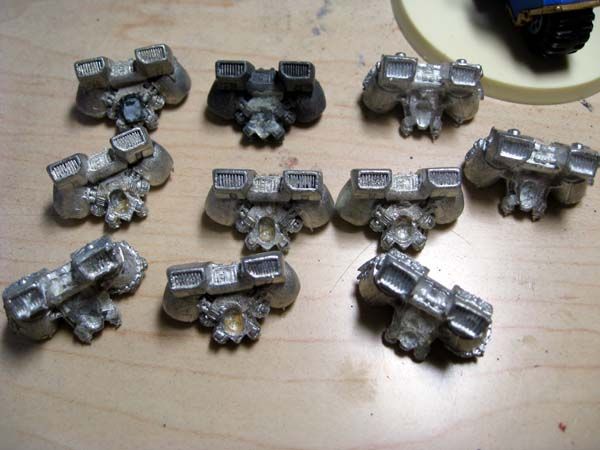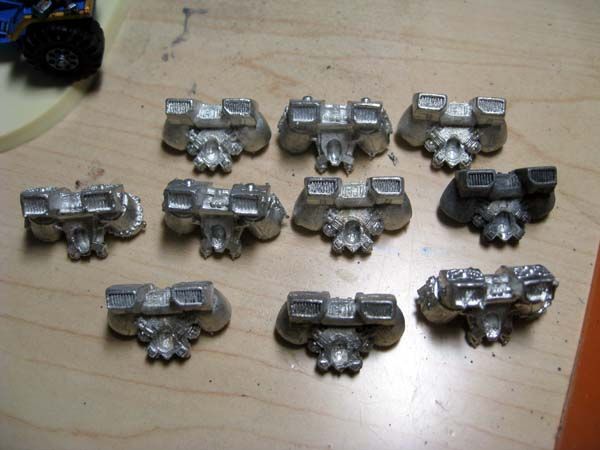I just wanted to share a quick tip for refurbishing old models: acetone.
When I first started in the hobby, I was a poor waiter struggling to pay my phone bill, let alone buy models. As a result, I was turned on to eBay and secondhand models. I quickly learned how to remove paint and recover abused models, all for a fraction of the cost of new stuff. I no longer buy used models (I only buy bitz online, and all my new kits from the FLGS), but I haven't lost those salvage skills.
One trick I learned was the use of acetone. Any hardware store employee will tell you that acetone is a solvent and used for thinning paint or removing adhesives and glues. Any Poison Control Center employee will tell you it's perfect for removing superglue from one's fingers.
I have a love affair with metal models, and hoarded a ton of metal jump packs, seen here:
I stripped the paint off of most of these using a process involving Simple Green followed by overn cleaner. I'll cover that process in a later post. The problem with those two methods, though, is that they don't remove glue, enamels, or varnishes.
As you can see in the photo, some of these packs have significant amounts of old superglue, plastic, and general crud built up in the seams. The pack in the far upper left actually has part of a plastic torso stuck to it from when I ripped it off the unsalvageable Assault Marine. There's a ring of Testor's enamel paint around it, and a whole lot of superglue.
Enter the acetone!
Get yourself a small glass jar and a can of pure acetone. Don't waste your time with nail polish remover. It's actually cheaper by volume to go to the hardware store and get a small can of pure acetone.
Also, save yourself a disaster and do not use plastic jars, cups, or containers for this. Acetone eats most plastics almost on contact.
Fill the jar with your models and bitz, and pour in enough acetone to cover them all. Put the lid on tight and set the jar someplace no one will disturb it overnight.
Come back in the morning and open the jar. Pull out the pieces and rinse them off under warm water. All of the superglue and paint should have dissolved away, leaving you with fresh metal parts.
The jump packs are all now squeaky clean and ready for use by my Marines!
I wanted to show you what happened to the plug of plastic on the previously highlighted pack but as I was pulling it out of the jar, I dropped it down the sink. Oops! Acetone essentially reduces polystyrene (the plastic our models are made of) to the consistency of Silly Putty.
Never, EVER attempt to remove paint from plastic or resin models with acetone of any sort!



I'll keep that in mind the next time I'm stuck refurbishing an old metal model. Thankfully it's not often but my metal Prince and Greater Daemon could have used this. Would have been easier than the manual method!
ReplyDeleteYeah, i have a couple early refurb projects that would have benefited from this treatment. My old-school las/plas Razorback has a ton of glue crusted on it, as do my first couple of attack bike sidecars.
Delete*** WARNING ***
ReplyDeleteAcetone is a cancer agent and causes nerve damage. First, don't get it on your hands, second, you shouldn't even be breathing the stuff. I give this warning whenever I see someone suggest nail polish remover... using the pure stuff is just down right DANGEROUS.
And if you're disposing it down your sink, well, think of what it does to plastic minis... guess what a bunch of your plumbing is made out of? (Guess what happens when it pools in your trap)
Read some more of my hobby safety tips here...
http://www.wargamingtradecraft.com/2010/07/hobby-safety.html
You're better off using something like Simple Green.
Hi, Dave.
DeleteI'm not sure where you heard that acetone is a carcinogen or is dangerous in small quantities, but that is misleading information. Hardware store grade acetone is vapor harmful in closed environments and can cause breathing issues, but so is spray paint.
I'd recommend taking a run through the data sheet for acetone from the Agency for Toxic Substances and Disease Registry: http://www.atsdr.cdc.gov/toxfaqs/tfacts21.pdf
Acetone is not a listed carcinogen.
Yes, acetone does soften PVC. In fact, it's the primary ingredient in Purple Primer used for joining PVC piping. No, you should not pour pure acetone down your drains. That being said, pouring the small amounts used for wargaming purposes down the drain while running the tap will dilute the acetone to benign levels. Don't go pouring gallons of acetone down your drain, of course.
As I said in the post, Simple Green does not remove superglue or epoxy, and so is not a suitable replacement for acetone for removing those substances from metal models.
I applaud your efforts to educate folks about hobby safety, but the page you linked has some inaccurate information. Acetone's status as a carcinogen has been mentioned, but you also mention banning of pink and blue insulation. this is also incorrect. Pink/blue are made of extruded polystyrene, the same base plastic our models are made from. It's urea formaldehyde foam that was/is banned. that's the self-expanding, spraygun-applied foam found in old homes. It has no practical use for wargaming.
A dose of common sense is helpful any hobbyist, and I do recommend reading the warning labels on unknown chemicals and products.
As mentioned in my safety article, your source for specific information should always be a product's MSDS (Material Safety Data Sheet), which will have plenty more information than a warning label.
ReplyDelete"Special Remarks on Chronic Effects on Humans:
May affect genetic material (mutagenicity) based on studies with yeast (S. cerevisiae), bacteria, and hamster fibroblast cells.
May cause reproductive effects (fertility) based upon animal studies. May contain trace amounts of benzene and formaldehyde
which may cancer and birth defects. Human: passes the placental barrier."
http://www.sciencelab.com/msds.php?msdsId=9927062
Many of the industry ISO standards actually prevent factories from even having it on the premiss.
You can't just pull quotes out of an MSDS sheet and call them facts. MSDS sheets also classify the threshold levels and exposure times of the represented agents. Your quote is for chronic, long term exposures.
DeleteOccasional use for hobby purposes is NOT long-term, chronic use.
I won't continue to go back and forth with you on this. A quarter-cup of acetone used to remove superglue or enamel paint will not harm you, so long as you're not drinking or huffing the stuff.
"You can't just pull quotes out of an MSDS sheet and call them facts."
ReplyDeleteThat must be why they're the world standard for chemical safety.
I'm not refuting your source, man. I'm objecting to your partial use of data to prove a flawed point.
Delete"Acetone causes cancer." is a misleading an incomplete statement. "Acetone can cause cancer after concentrated, long-term exposure. Concentrated, long-term exposure is defined as exposure for greater than 4 hours on a daily basis." is a complete statement.
You are absolutely correct rhino.... And to argue with this man would be a huge waste of your time.. If he wants to live his life wearing a hazmat suit that is his right to do so...lmao.
DeleteI messed up on a paint job on some small figures and mixed some enamel thinner with acetone to remove all of it (3 layers). No noticable degradation to the models in any visual details,but they now have the feel of rubber. Anything I should worry about?
ReplyDeleteIam very happy to have such a blog here.I searched a lot and at last i find out the apt one..This blog is very informative for me and your knowledge about this topic is appreciable . Sohman Epoxy also contains a lot of information.This website also help me to deepen my knowledge..Just check this one also BCA surely you may get some more details about the topic.Thank you.
ReplyDelete